Mozilla releases a page ``Platform Tilt'' that summarizes technical problems that Apple, Google, and Microsoft have set up to treat Firefox more poorly than their own browsers

Microsoft develops operating systems for PCs and smartphones, such as Windows, Apple iOS and macOS, and Google Android and ChromeOS. is preinstalled. These manufacturers sometimes recommend their own browsers over third-party browsers , but the developer of Firefox says that they are not only trying to defeat competing browsers by leaving technical issues unsolved. One Mozilla has pointed this out and has published a page called ' Platform Tilt ' that summarizes related information.
Platform Tilt - Mozilla
https://mozilla.github.io/platform-tilt/

The technical issues pointed out by Mozilla at the time of article creation are as follows.
◆Apple
・App Store prohibits third-party browser engines
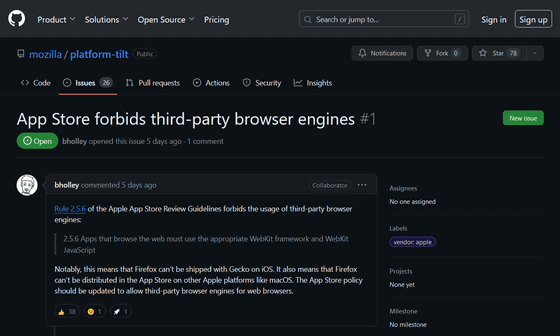
Apple prohibits the use of third-party browser engines in 2.5.6 of its App Store Review Guidelines as follows:
2.5.6 Apps that browse the web must use the appropriate Webkit framework and WebKit JavaScript.
As a result, the iOS version of Firefox cannot use Firefox's own browser engine, Gecko , and Firefox cannot be distributed on the App Store for macOS. Therefore, Mozilla is asking Apple to update its App Store guidelines and allow third-party browser engines.
・Support for third-party multi-process apps on iOS
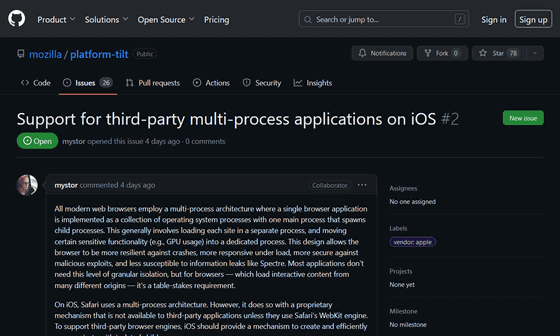
Most modern web browsers employ a multi-process architecture, where a single browser app is implemented as a collection of OS processes with one main process that spawns child processes. This typically involves loading each site into a separate process and moving certain sensitive functions (GPU usage) to a dedicated process. This design makes the browser more resilient to crashes, more responsive under load, more secure against malicious exploits, and less susceptible to information leaks like Specter. Most apps don't need this level of fine-grained separation, but it's an important requirement for browsers that load interactive content from a variety of origins.
Safari on iOS employs a multi-process architecture, which employs unique mechanisms that are not available to third-party apps unless they use Safari's WebKit . To support third-party browser engines, iOS must provide a mechanism to create and efficiently communicate with isolated child processes.
・JIT support on iOS
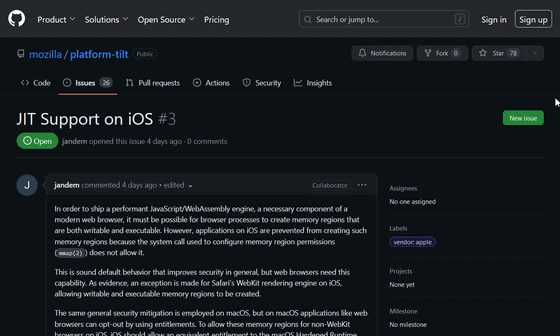
To provide a high-performance JavaScript/WebAssembly engine, a necessary component of modern web browsers, browser processes must be able to create writable and executable memory regions. However, apps on iOS cannot create memory regions because the system calls used to configure memory region permissions do not allow this.
This is generally a healthy default behavior that improves security, but web browsers require this functionality. As evidence, Safari's WebKit on iOS has the ability to create a writable and executable memory area as an exception.
・Accessibility API on iOS
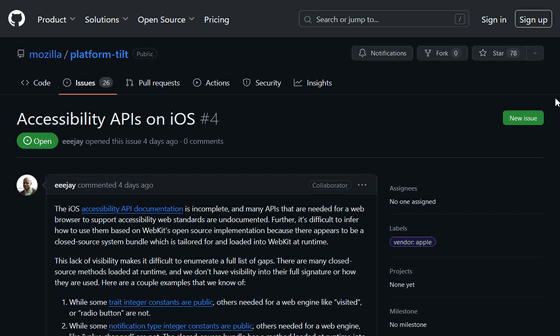
iOS accessibility API documentation is incomplete, and many of the APIs required for web browsers to support accessibility web standards are undocumented. Furthermore, it has become difficult to guess how to use them based on WebKit's open source implementation. This is because there are closed-source system bundles that are tailored to WebKit and loaded into WebKit at runtime.
・Message integration on iOS
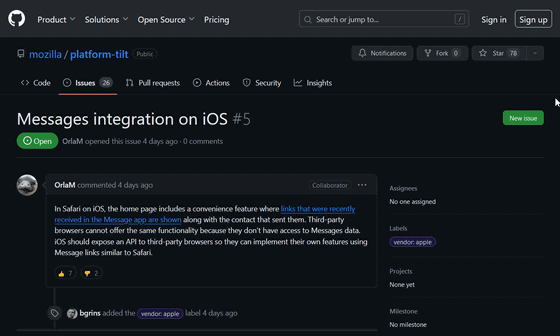
Safari on iOS includes a handy feature that displays recently received links in the Messages app, along with the contact they came from . However, third-party browser apps do not have access to message data, making it impossible to implement similar functionality. Therefore, Mozilla argues that Apple needs to open the API to third parties so that they can implement functionality similar to Safari.
・Importing browser data on iOS
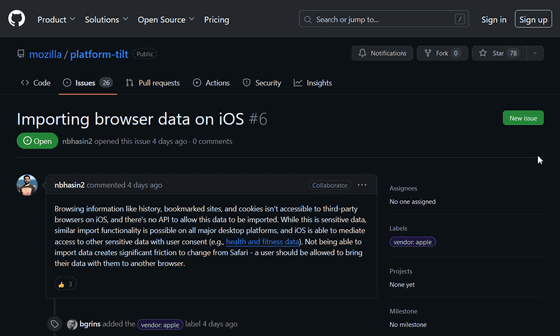
On iOS, third-party browsers cannot access browsing information such as history, bookmarks, and cookies, and there is no API to import this data. Although this is sensitive data, similar import functionality is available on major desktop platforms, so Mozilla says Apple should implement the data import functionality with user consent. Mozilla argues that it is necessary to be able to import data from Safari because it will be difficult to switch to another browser.
・Set and check iOS default browser
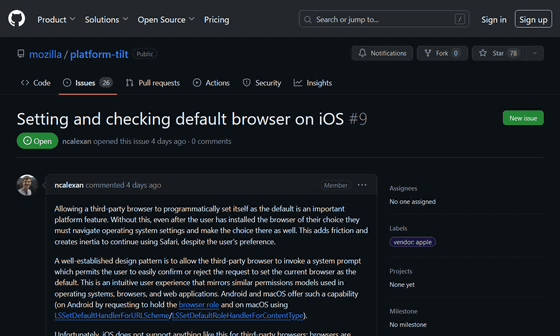
Mozilla claims that ``allowing third-party browser apps to be set as the default browser is an important feature for the platform.'' Android and macOS implement this feature, but iOS does not support it.
・Features that rely on origin-based related domains for third-party browser engines on iOS
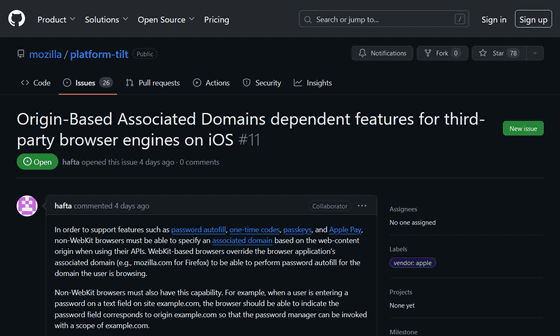
Mozilla needs to be able to specify associated domains based on the origin of web content so that browser engines other than WebKit can support features such as password autofill, one-time codes, passkeys, and Apple Pay. claims.
WebKit-based browsers override the domain associated with the browser app (such as mozilla.com in the case of Firefox) and allow password autofill to be performed for the domain the user is viewing.
・Support for browser extensions on iOS
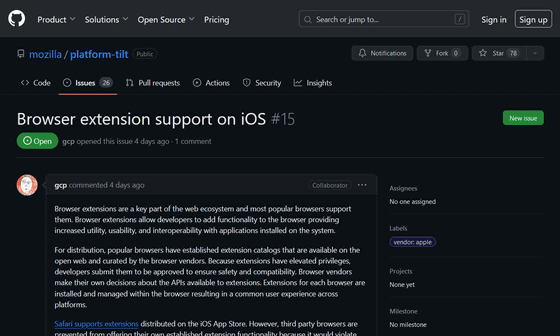
Browser extensions are an important part of the web ecosystem and are supported by most popular browsers. Browser extensions allow developers to add new functionality to the browser, improving its utility, ease of use, and interoperability with other apps installed on the OS.
The iOS version of Safari supports extensions, but third-party browser apps cannot support extensions because they violate App Store Review guidelines 2.5.2 . Mozilla is asking for the App Store Review guidelines to be relaxed, as it is strange that extensions can only be supported by third-party browser apps.
・Beta test on iOS
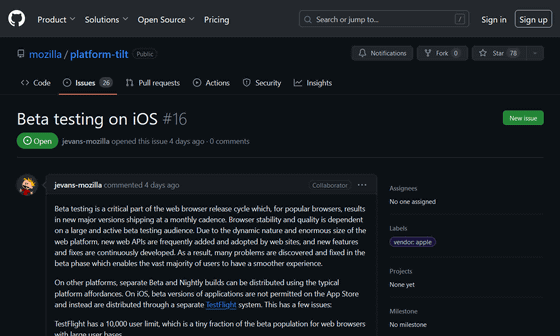
Beta testing is an important part of the web browser release cycle, with new major versions of popular browsers being released every month. As such, Mozilla claims that the stability and quality of the browser depends on extensive and active beta testing.
Although platforms other than iOS allow you to distribute individual beta and nightly builds, the App Store does not allow you to distribute beta versions of your app on iOS, and the use of TestFlight is recommended. . However, TestFlight has a user limit of ``10,000'', which seems to be a big limit for browsers with large user bases.
◆Google
・Importing browser data on Android
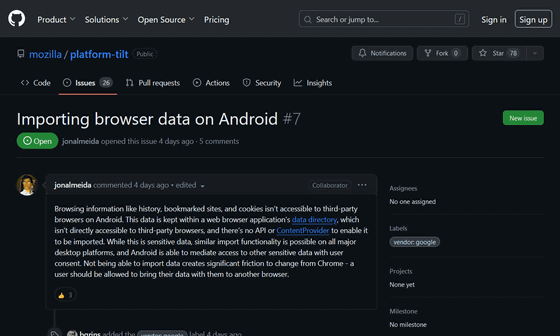
Android third-party browsers do not allow access to browsing information such as history, bookmarks, and cookies. Although this data is stored within your web browser's data directory , it is not directly accessible to third-party browsers, and there are no APIs or content providers to enable import. Although this data is sensitive, Mozilla insists that similar import functionality is implemented on major desktop platforms and should be implemented on Android as well.
・Some Android features launch Chrome instead of the user's default browser
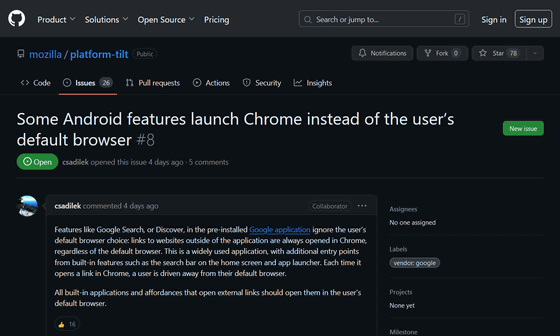
When you use Google Search in the pre-installed Google app on Android or tap content that appears in Discover , even if the user has selected a browser app other than Chrome as their default browser, the content appears in Chrome. It seems that it will open. Mozilla insisted that all external links should be opened in the default browser.
- Poor quality search results in third-party browser engines on Android
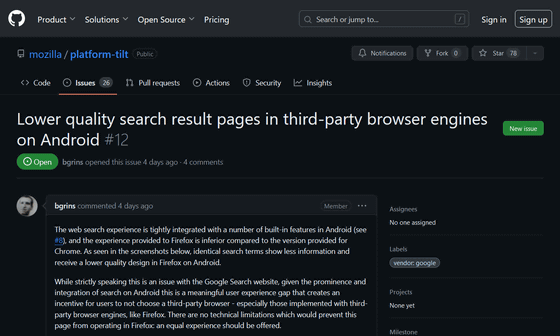
Although the web search experience is tightly integrated with various Android features, Mozilla claims that the experience offered in Firefox is inferior compared to that offered in Chrome. In the case of the Android version of Firefox, even if you perform the same word search, Firefox will display less information on the search results page and the quality of the design will also be lower.
The images below are the search results page when searching for the same word on the Android version of Chrome on the left and the Android version of Firefox on the right.

◆Microsoft
・Default browser settings on Windows
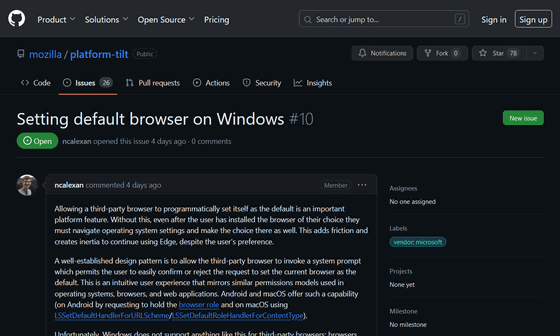
Although Windows provides the ability to set third-party browsers as the default browser, in Windows 10 it requires a few clicks to change the default browser, and in Windows 11 it requires a few clicks to change the default browser. Mozilla also claims that changing settings is more troublesome than on Android or macOS.
- Attempts to set the default browser to Edge through some Windows flows
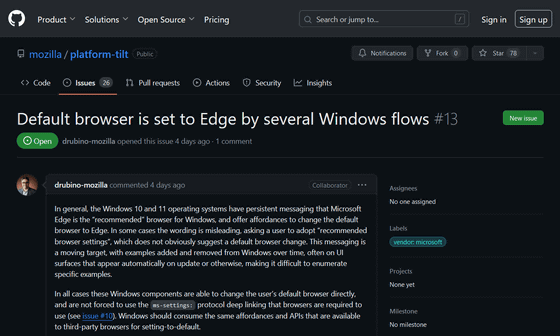
Windows 10 and Windows 11 permanently display a message that Microsoft's Edge is the recommended browser for Windows, and users of third-party browsers are constantly encouraged to ``switch to Edge.'' This notification comes in a variety of formats, and is added and removed over time, making it difficult to cite specific examples. In either case, these notifications attempt to change a Windows user's default browser from a third-party browser to Edge by using a protocol that directly changes the default browser.
``A new feature that desperately urges you to stop downloading Chrome'' has been added to Edge, and the actual screen looks like this - GIGAZINE

A pop-up appears asking 'Why?' when users download Chrome on Edge - GIGAZINE

- Some Windows features launch Edge instead of the user's default browser
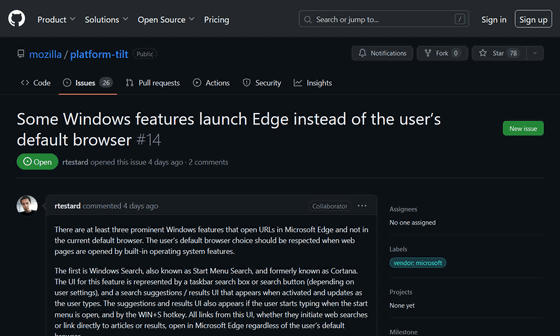
There are at least three major Windows features that open URLs in Edge instead of the default browser. The first is the search function available from the Windows Start menu, and if you perform a web search from here, the search results will be displayed in Edge no matter what your default browser settings are. The second is Windows Copilot, and if Copilot generates a link within the response, the link will open in Edge no matter what you have set as your default browser in Edge. The third is ' News and Interests ' displayed on the Windows 10 taskbar, which also opens all links in Edge regardless of the default browser.
Related Posts:
in Software, Posted by logu_ii







